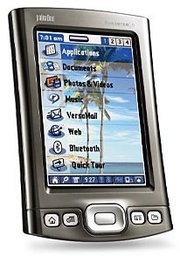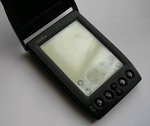|
The
Personal
Digital Assistant or PDA
PDAs or palmtops are
handheld
devices that were originally designed as personal
organizers, but became much more versatile over the years. A basic
PDA usually includes date
book, address
book, task
list, memo
pad, clock,
and calculator
software. Many PDAs can now access the Internet via Wi-Fi,
cellular or Wide-Area Networks (WANs) or Bluetooth
technology. One major advantage of using PDAs is their ability to
synchronize data with a PC
or home
computer.
A
portable
computer that is small enough to be held in one's hand. Although
extremely convenient to carry, handheld computers
have not replaced notebook
computers because of their small keyboards
and screens. The most popular hand-held
computers are those that are specifically designed to provide PIM
(personal information manager) functions, such as a calendar
and address book.
Some
manufacturers are trying to solve the small
keyboard problem by replacing the keyboard with an
electronic pen. However, these pen-based devices
rely on handwriting
recognition technologies, which are still in
their infancy.

Tungsten
T5 PDA
Overview
The
term "personal digital assistant" was coined
on January
7, 1992
by John
Sculley at the Consumer
Electronics Show in Las
Vegas, Nevada,
referring to the Apple
Newton. Earlier devices like the Psion
and Sharp
Wizard have the functionality to be considered PDAs,
however. PDA's are some times refered to as "Palms" or
"Palm Pilot" after an early PDA created by Palm, Inc. This
usage is similar to refering to a "tissue" as a
"Kleenex".
The
currently major PDA operating
systems are:
-
Palm
OS - owned by Palm,
Inc.
-
Windows
Mobile (Pocket
PC), (based on the Windows
CE kernel) - owned by Microsoft
-
BlackBerry
- owned by Research
In Motion
-
Many
operating systems based on the Linux
kernel - free (not owned by any company) These include:
-
Symbian
OS (formerly EPOC)
owned by Ericsson, Panasonic, Nokia, Samsung, Siemens
and Sony
Ericsson
Many
PDAs run using a variation of the ARM
architecture (usually denoted by the Intel XScale trademark).
This encompasses a class of RISC microprocessors
that are widely used in mobile
devices and embedded
systems, and its design was influenced strongly by a popular 1970s/1980s
CPU,
the MOS
Technology 6502.
According
to a Gartner market
study, the overall market for PDAs grew by 20.7% in the third (Q3) of
2005,
compared to Q3 2004,
with marketshare resolving as follows (by operating system):
-
for Palm, Inc. PDAs and some other
licensees-
14.9% (declining)
-
Windows
Mobile for PDAs that comply with the
Microsoft's Pocket
PC specifications - 49.2% (increasing)
-
BlackBerry
OS for BlackBerry
PDA (produced by Research
In Motion) - 25.0% (increasing)
-
Symbian
OS - 5.8% (increasing)
-
Various
operating systems based on the Linux
kernel for various
special designed PDAs (many
other supported) - 0.7% (stable)
-
Other
- 4.4% (stable)
The
reason usually cited for the resumption in PDA market growth (after
market declines in 2002 - 2004) is the growing interest in PDAs
offering wireless email capabilities (such as BlackBerries), and PDAs
with built-in GPS capabilities for navigation. Smartphones
— mobile
phones with PDA-like abilities will likely curtail PDA growth in
the near future, as smartphones are becoming very popular.

Palm
IIIxe PDA
Popular
PDAs
-
Apple
Computer Newton
-
BlackBerry
-
hp
iPAQ Pocket PC (Originally Compaq iPAQ until HP merged in 2002)
-
Palm
Pilot, Tungsten, LifeDrive, Treo
and Zire
-
Sharp
Wizard
and Zaurus
-
Sony
CLIÉ
-
Tapwave
Zodiac
-
AlphaSmart
Dana
-
Dell
Axim
-
GMate
Yopy
-
Fujitsu
Siemens Loox
720
-
List
of PalmOS Devices
Other
uses
-
Media
player
-
Audio
recorder
-
Camera
(still & video)
-
Remote
control
-
Wifi
clients
-
Video
game emulator
-
Photo
browser
-
GPS
receiver
-
Cell
Phone
-
Data
Storage Device
LINKS:
|